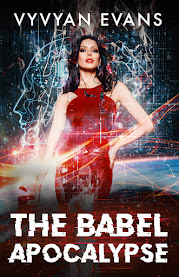
THE BABEL APOCALYPSE
by
Vyvyan Evans
Science Fiction
Publisher: Nephilim Publishing
Publication Date: May 2, 2023
Page count: 388 pages
SCROLL DOWN FOR GIVEAWAY!
SYNOPSIS:
Language is no longer learned, but streamed to neural implants regulated by lang-laws. Those who can't afford language streaming services are feral, living on the fringes of society. Big tech corporations control language, the world’s most valuable commodity.
But when a massive cyberattack causes a global language outage, catastrophe looms.
Europol detective Emyr Morgan is assigned to the case. His prime suspect is Professor Ebba Black, the last native speaker of language in the automated world, and leader of the Babel cyberterrorist organization. But Emyr soon learns that in a world of corporate power, where those who control language control everything, all is not as it seems.
As he and Ebba collide, Emyr faces an existential dilemma between loyalty and betrayal, when everything he once believed in is called into question. To prevent the imminent collapse of civilization and a global war between the great federations, he must figure out friend from foe—his life depends on it. And with the odds stacked against him, he must find a way to stop the Babel Apocalypse.
PRAISE FOR THE BABEL APOCALYPSE:
The Babel Apocalypse earned a starred review in Kirkus:
"A perfect fusion of SF, thriller, and mystery—smart speculative fiction at its very best."
The full review is HERE!
CLICK FOR MORE INFORMATION OR TO PURCHASE!
| Book Website | Amazon | Barnes & Noble | IndieBound | Kobo |
READ AN EXCERPT:
As I was about to glance back at the voices, a light flickered in my peripheral vision, drawing my gaze upward to the night sky. A soft white glow, high up in the dark. At first it was indistinguishable from the airway lights. But it persisted, the size of a small disk at first, before shifting to red-orange, getting larger. At that point I realized it definitely couldn’t be a hover car. This was farther up, probably low Earth orbit, which explained the initial white. But the shift in coloration—that meant a detonation, producing nitrogen dioxide, which turned deep orange when mixed with air. A gaseous cloud has reached the atmosphere, I thought. I was witnessing a chemical explosion in space large enough to be visible to the naked eye. But what was exploding?
As I continued looking up, the orange grew in intensity until it flared across the skyline, illuminating the entire landscape around me with an eerie red-orange. It was only then that I became aware of the newly hushed silence of the drunken revelers nearby. And the silhouettes of other people too, who had also stopped and peppered the pedestrian corridor. We were all now strange red creatures, watching transfixed in rapt silence as the night sky was on fire. And just as suddenly as it had appeared, it was gone; the orange light faded back into a deep well of pitch black.
GUEST POST:
‘The Babel Apocalypse’ imagines a future in which we stream language directly to neural implants in our heads.
Today, we stream anything from movies, to books, to music, to our ‘smart’ devices, and consume that content. Smart devices use streaming signals—data encoded in IP data packets—encoded and distributed via wi-fi internet. Language streaming would work, in principle, in the same way. With a ‘language chip’ implanted in our brains, we will be able to ‘stream’ language from internet-in-space on demand, 24/7.
Moreover, based on an individual’s level of subscription to a language streaming provider, they would be able to stream any language they chose, with any level of lexical complexity. This means that someone could, potentially, apply for a job in any country in the world, without needing to be concerned about knowing the local language. Rather, the individual would just draw upon the words and grammar they need, to function in the language, by syncing to a language database, stored on a server in space. And call it up, over the internet, in real time, as they think and talk. It means that everything someone needs to know, to be able to use a language, is streamed over the internet, rather than being stored in someone’s head. Language learning, thus, becomes obsolete.
Science fiction has a long and illustrious habit of predicting the future. In 1940, with his first in the Robot series of stories, Isaac Asimov predicted some of the ethical issues that would arise as artificial intelligence comes to have a more pervasive influence in our daily lives.
Today in the twenty-first century, we are on the brink of a Fourth Industrial Revolution, sometimes dubbed 4IR. This is where automation and connectivity, via the internet, will dramatically alter the way in which we interact with each other, as well as everything around us, in our increasingly joined-up technological environment. And I predict, in less than one hundred years from now, this new technology will transform many aspects of our daily lives that we currently take for granted, including language itself.
Indeed, in 2015, many of the world’s leading scientists, warned, in an Open Letter and accompanying report, against the new dangers of AI, as a consequence of 4IR. This Open Letter was issued in response to new breakthroughs in AI that, without adequate control, might pose short and long-term existential threats to humans.
But potential dangers come not just from the use of AI, in the sense of, for instance, The Terminator series of movies, in which AI seeks to wage war and destroy the human race. New implantable devices, that will enhance how we as humans can interact with our new tech-landscape, will also give rise to potential dangers. Language is, arguably, the single trait that is the hallmark of what it is to be human. And yet, in the near-future, language-chipped humans, or ‘transhumans’, will have enhanced abilities that bring new opportunities, as well as ethical challenges and even threats.
‘The Babel Apocalypse’ is a genre-blending dystopian, sci-fi mystery-thriller that will make you think about language in a whole new way.
ABOUT THE AUTHOR:

Dr. Vyvyan Evans is a native of Chester, England. He holds a PhD in linguistics from Georgetown University, Washington, D.C., and is a Professor of Linguistics. He has published numerous acclaimed popular science and technical books on language and linguistics. His popular science essays and articles have appeared in numerous venues including 'The Guardian', 'Psychology Today', 'New York Post', 'New Scientist', 'Newsweek' and 'The New Republic'. His award-winning writing focuses, in one way or another, on the nature of language and mind, the impact of technology on language, and the future of communication. His science fiction work explores the status of language and digital communication technology as potential weapons of mass destruction.
GIVEAWAY! GIVEAWAY! GIVEAWAY!
The author will be awarding a physical paperback copy of the book (available internationally) to a randomly drawn commenter.


Thanks for hosting!
ReplyDeleteThanks from me too!
ReplyDelete